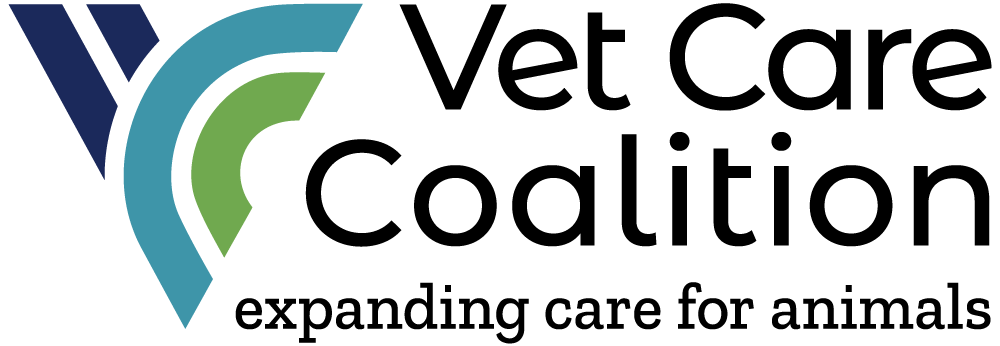 News Release
News ReleaseColorado pet owners say yes, they want access to mid-level veterinary professionals and telehealth
Vet Care Coalition
Responding to increasing costs and unavailability due to the state’s significant veterinary workforce shortage, four out of five Colorado pet owners say they would not hesitate to have their animal seen by a newly-created mid-level veterinary professional associate, similar in function and oversight to a physician assistant (PA). These are among the findings of an independent survey of Colorado pet owners announced by the Vet Care Coalition (VetCareCoalition.com), an expanding alliance of animal welfare organizations, veterinarians and technicians, pet owners, ranchers and other experts working to establish workable solutions to the state’s costly veterinary workforce shortage. The Vet Care Coalition is pursuing legislation in Colorado’s statehouse to achieve three common-sense initiatives toward addressing the state’s veterinary shortage: 1. Establishing a path for creation of a mid-level veterinary professional associate (VPA), similar to a physician assistant (PA) in human medicine. A VPA will be a master’s degree-level professional working under the supervision of a veterinarian to provide care such as examining pets, diagnosing minor conditions, performing routine surgeries and leading healthcare teams. These professionals will generate practice revenue while increasing overall workforce capacity, helping to increase patient availability while lowering costs. 2. Codifying the availability of veterinary care through telehealth services, which are increasingly used in human medicine. More than half of the state’s pet owners surveyed said they would be comfortable using virtual veterinary care for their animals. 3. Expanding the role of registered veterinarian technician specialists (VTS), with additional training and credentialing. “Vet tech” specialists are often underutilized in veterinary practices because Colorado regulations unreasonably limit what they can legally do. Expanding the role of a VTS will increase veterinary care capacity across the state while helping encourage retention at a time when many are leaving the sector due to burn-out and lack of professional growth. Colorado’s veterinary shortage is well-documented In 2021, the U.S. Department of Agriculture identified 25 rural and urban Colorado counties as having “veterinary shortage situations” in food animal medicine – a situation that contributes to higher prices while putting food safety at risk. In addition, the Veterinary Care Accessibility Project (AccessToVetCare.org) gave Colorado a score of only 58 out of 100, noting that veterinary care is nearly inaccessible in much of the state. The shortage has had a negative impact on pet owners and their animals across the country – and could get much worse. A Mars Veterinary Health study found that without solutions put in place soon, the U.S. will have 15,000 fewer veterinarians than it needs by 2030, leaving some 75 million pets without any veterinary care at all. The Colorado survey, conducted in mid-January by Corona Insights research firm, asked 556 pet owners across the state how they have been impacted by the veterinary shortage and gauged their initial comfort level with being seen by a VPA or via telehealth services. The research found that high veterinary costs generate the greatest level of concern and dissatisfaction among pet owners, with almost 25 percent saying high costs made them decide against taking their animals in for necessary care over the last year. The U.S. Dept. of Labor Consumer Price Index shows that between 1997 and 2022, veterinarian services steadily rose at almost twice the rate of inflation. Through 2021 and 2022 alone, the nation’s veterinary shortage contributed to service prices increasing by more than 13 percent. More than a quarter of survey respondents also said they were significantly challenged in finding and making timely appointments with veterinarians in their area. Logical and urgent need for a mid-level veterinary professional “While the human medical profession has embraced physician assistants for more than 50 years, veterinary medicine inexplicably still has no such mid-level professional position,” said coalition spokesperson Dr. Apryl Steele, past president of the Colorado Veterinary Medical Association (CVMA) and current CEO of the Dumb Friends League. “Animals will suffer until we fill this glaring need,” said Dr. Steele, “while Colorado’s veterinary workforce will continue to be severely overworked and understaffed.” The American Medical Association (AMA) officially recognized physician assistants in 1971, with the first PA certification tests implemented by the National Board of Medical Examiners two years later. “The VPA would not replace a veterinarian or a veterinary technician,” said Dr. Steele. “Rather, it will enhance a practice while providing credentialed veterinary technicians with a career path toward greater responsibility and compensation.” In Colorado’s USDA-identified veterinary shortage areas, VPAs will be allowed to work under indirect supervision to help increase access to care for food and fiber animals. “It’s important to understand that fully utilizing veterinary technicians and creating a mid-level veterinary PA are complementary options for solving Colorado’s veterinarian workforce shortage crisis,” said Dr. Steele. “We absolutely need both.” About the Vet Care Coalition The Vet Care Coalition is an expanding alliance that includes animal welfare organizations, veterinarians and technicians, pet owners, ranchers and other experts with a common goal to find workable solutions to the state’s costly veterinary workforce shortage. Organizational coalition members supporting the legislation include the Animal Welfare Association of Colorado (AWAC), Colorado Voters for Animals, the Dumb Friends League (DFL), Thrive Pet Healthcare, Humane Society of the Pikes Peak Region (HSPPR), Roice-Hurst Humane Society, Virtual Veterinary Care Association, Animal Policy Group, WellHaven Pet Health, Larimer Humane Society, the American Society for the Prevention of Cruelty to Animals (ASPCA) and Mars Petcare. Individual supporters include four former presidents of the Colorado Veterinary Medical Association (CVMA), as well as a growing number of veterinarians, practice owners and animal welfare advocates across the nation. For more information and to support efforts to increase access to veterinary care across Colorado, please visit www.vetcarecoalition.com. Contact Details Vet Care Coalition Steven Silvers +1 720-402-8820 ssilvers@vetcarecoalition.com
March 21, 2023 08:50 AM Mountain Daylight Time







